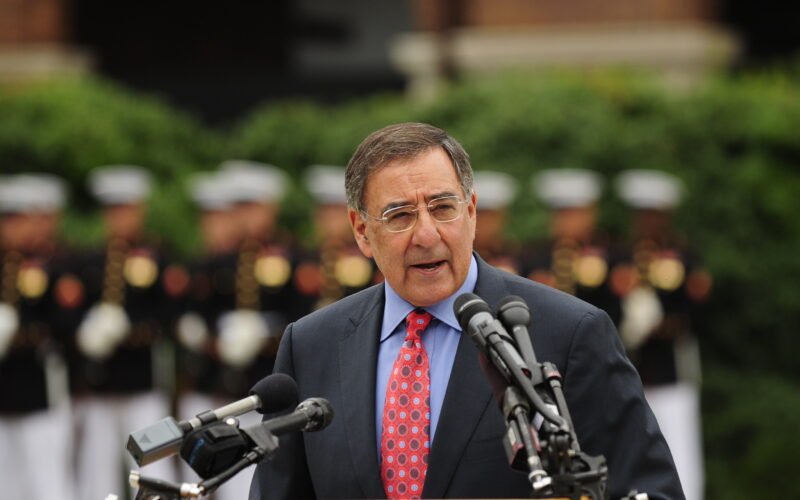Leon Panetta: Early Life and Education, Early Political Career, U.S. House of Representatives, White House Chief of Staff
Early Life and Education
Leon Edward Panetta was born on June 28, 1938, in Monterey, California. His parents, Carmelina Maria and Carmelo Frank Panetta, were Italian immigrants from Siderno, Calabria. The Panetta family owned a restaurant in Monterey during the 1940s. Panetta was raised in the Monterey area, attending Catholic grammar schools San Carlos School and Junípero Serra School, and later Monterey High School, where he was actively involved in student politics, serving as vice president and then president of the student body.
In 1956, Panetta began his undergraduate studies at Santa Clara University, graduating magna cum laude in 1960 with a BA in political science. He continued at Santa Clara University School of Law, earning his Juris Doctor in 1963. In 1964, Panetta joined the U.S. Army as a second lieutenant, served as an officer in the Army Military Intelligence Corps, and received the Army Commendation Medal before being discharged as a first lieutenant in 1966.
Early Political Career
Panetta’s political career began in 1966 when he became a legislative assistant to Republican Senator Thomas Kuchel. In 1969, he was appointed assistant to Robert H. Finch, Secretary of the U.S. Department of Health, Education, and Welfare under President Richard Nixon. Soon after, Panetta was named director of the Office for Civil Rights, where he enforced civil rights and equal-education laws despite Nixon’s strategy to slow enforcement to gain political support in the South. His strong stance on civil rights led to his departure from the position in 1970.
After leaving Washington, Panetta worked as an executive assistant for New York City Mayor John Lindsay and later wrote about his experiences in the Nixon administration in his 1971 book, Bring Us Together. He returned to Monterey to practice law at Panetta, Thompson & Panetta from 1971 to 1976.
U.S. House of Representatives
Elections
Panetta shifted his political affiliation to the Democratic Party in 1971, citing the Republican Party’s move away from the political center. In 1976, he was elected to the U.S. House of Representatives from California’s 16th congressional district, defeating incumbent Republican Burt Talcott with 53% of the vote. Panetta was reelected eight times without facing another contest as close as his initial election.
Tenure
During his tenure in Congress, Panetta focused on various issues, including budget matters, civil rights, education, healthcare, agriculture, immigration, and environmental protection. He was instrumental in passing the Hunger Prevention Act (1988) and the Fair Employment Practices Resolution. Panetta authored legislation to establish the Monterey Bay National Marine Sanctuary and provide Medicare coverage for hospice care. He also played a key role in the establishment of California State University, Monterey Bay.
Panetta proposed the creation of the Big Sur National Scenic Area, a 700,000-acre protected zone along the Big Sur coast. Despite significant opposition from local residents, development interests, and California Senator S. I. Hayakawa, the bill did not progress past the energy committee.
Later Career
In 1997, Panetta co-founded the Panetta Institute for Public Policy at California State University, Monterey Bay. The institute aims to inspire and prepare individuals for public service and engage them in the democratic process. Panetta also served as a distinguished scholar and professor of public policy at Santa Clara University.
In January 2009, President Barack Obama nominated Panetta as Director of the Central Intelligence Agency (CIA), where he oversaw the operation that resulted in the death of Osama bin Laden. In April 2011, Panetta was nominated and confirmed as Secretary of Defense, a position he held until February 2013, when he was succeeded by Chuck Hagel.
Since retiring, Panetta has continued his work with the Panetta Institute, served on various boards and commissions, and remains active in writing and lecturing on public policy issues.
Committee Assignments
During his tenure in the U.S. House of Representatives, Panetta held several key committee assignments:
- Chairman of the U.S. House Committee on the Budget: Panetta played a pivotal role in shaping national fiscal policy and budgeting.
- Chairman of the Agriculture Committee’s Subcommittee on Domestic Marketing, Consumer Relations, and Nutrition: He focused on agricultural policies and nutrition-related issues.
- Chairman of the Administration Committee’s Subcommittee on Personnel and Police: Panetta oversaw issues related to personnel and police matters within the administration.
- Chairman of the Task Force on Domestic Hunger: This task force, created by the U.S. House Select Committee on Hunger, addressed issues related to domestic hunger and food insecurity.
- Vice Chairman of the Caucus of Vietnam-Era Veterans in Congress: He advocated for the interests and issues concerning Vietnam-era veterans.
- Member of the President’s Commission on Foreign Language and International Studies: Panetta contributed to discussions on enhancing foreign language skills and international studies.
Director of the Office of Management and Budget
In early 1993, despite being elected to a ninth term in Congress, Panetta left the House to become the Director of the Office of Management and Budget (OMB) under President Bill Clinton. In this role, he was instrumental in developing the budget plan that contributed to the balanced budget achieved in 1998.
White House Chief of Staff
In July 1994, President Clinton appointed Panetta as White House Chief of Staff, replacing Mack McLarty. Clinton sought Panetta’s leadership to address issues of order and focus within the White House, spanning both domestic and foreign policy matters. Panetta’s tenure as Chief of Staff lasted until January 1997. He played a critical role in negotiating the 1996 budget, a significant step toward achieving budgetary balance.
Director of the CIA
Nomination
On January 5, 2009, President-elect Barack Obama announced his intention to nominate Panetta as Director of the Central Intelligence Agency (CIA). Despite concerns about Panetta’s limited intelligence experience, which stemmed from his prior military intelligence service in the 1960s, his extensive experience in government and personal rapport with the President were cited as strengths. Panetta was confirmed by the Senate on February 12, 2009, by voice vote.
Tenure
Panetta was sworn in as CIA Director on February 19, 2009, receiving a warm reception from CIA staff. As Director, he traveled extensively to intelligence outposts and collaborated with international leaders to address threats from Islamic extremism and the Taliban.
In 2010, Panetta led a secret review of the CIA’s use of enhanced interrogation techniques, known as the Panetta Review. The review criticized the Bush-era interrogation program and was aligned with the findings of the Senate Intelligence Committee report on CIA torture. Both reports focused on documenting the facts and preventing future abuses rather than pursuing accountability for past actions.
Panetta supported the Obama administration’s drone strike campaign in Pakistan, which he regarded as an effective method for targeting senior al-Qaeda leaders. Under his leadership, drone strikes increased significantly, including a notable surge in May 2009.
One of Panetta’s most significant achievements as CIA Director was overseeing the operation that led to the death of Osama bin Laden on May 1, 2011. This operation marked a major milestone in the fight against terrorism.




